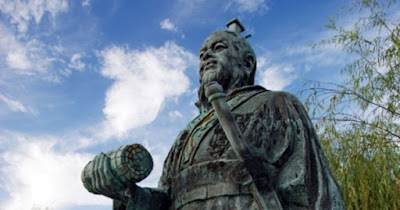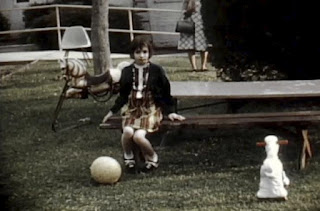The Art of War (Sun) / Sun Wu and his Book
In his comprehensive work Records of the Grand Historian, Chinese historian Sima Qian recounted a particularly harsh lesson learned by Helu (Ho Lu), the king of the state of Wu.[1]
During his reign (514–496 BCE), Helu read The Art of War, by the great Chinese strategist Sun Tzu. He was deeply impressed, and summoned the general to his court.
Image: “Statue of Sun Tzu in Yurihama, Tottori, in Japan.” Sun Tzu - Wikipedia
The king decided to test Sun Tzu’s military theories. He had an unsusual request: “May the test be applied to women?”
Helu watched the proceedings from a nearby raised pavilion. With Sun Tzu’s consent, 180 women were brought from the palace. The general quickly divided the women into two companies, and “placed one of the King’s favorite concubines at the head of each.”
He then bade them all take spears in their hands, and addressed them thus: I presume you know the difference between front and back, right hand and left hand?The girls replied: Yes.Sun Tzŭ went on: When I say "Eyes front," you must look straight ahead. When I say “Left turn," you must face towards your left hand. When I say "Right turn," you must face towards your right hand. When I say "About turn," you must face right round towards the back.Again the girls assented. The words of command having been thus explained, he set up the halberds and battle-axes in order to begin the drill. Then, to the sound of drums, he gave the order "Right turn."But the girls only burst out laughing.
“If words of command are not clear and distinct, if orders are not thoroughly understood, then the general is to blame,” Sun Tzu said to the assembled ladies.
So he started drilling them again, and this time gave the order "Left turn," whereupon the girls once more burst into fits of laughter.Sun Tzŭ said: If words of command are not clear and distinct, if orders are not thoroughly understood, the general is to blame.But if his orders are clear, and the soldiers nevertheless disobey, then it is the fault of their officers.
Sun Tzu ordered his men to cut off the heads of the two concubines acting as leaders of the companies. The King was alarmed; he did not want his favorite concubines to be executed for a test that had gone horribly awry.
He swiftly sent a message to Sun Tzu.
We are now quite satisfied as to our general’s ability to handle troops. If We are bereft of these two concubines, our meat and drink will lose their savor. It is our wish that they shall not be beheaded.Sun Tzŭ replied: Having once received His Majesty’s commission to be general of his forces, there are certain commands of His Majesty which, acting in that capacity, I am unable to accept.
Image: “Sun Tzu training the concubine army.” Sun Tzu and the Concubine Army
The two “officer” concubines were immediately beheaded. The general then installed the next two women in line as leaders. When the drums again sounded the call to drill, the women were ready.
The women did not make a sound, and completed all the drills with “perfect accuracy and precision.”
Then Sun Tzŭ sent a messenger to the King saying: Your soldiers, Sire, are now properly drilled and disciplined, and ready for Your Majesty’s inspection. They can be put to any use that their sovereign may desire; bid them go through fire and water, and they will not disobey.But the King replied: Let our general cease drilling and return to camp. As for us, We have no wish to come down and inspect the troops.Thereupon Sun Tzŭ said: The King is only fond of words, and cannot translate them into deeds.After that, Ho Lu saw that Sun Tzŭ was one who knew how to handle an army, and finally appointed him general.
NOTE: Most modern historians believe the story above is apocryphal, though other passages in Sima Qian’s Records have more support in the historical record. Scholars continue to debate the historicity of Sun Tzu himself.
Source:
The Art of War (Sun)/Sun Wu and his Book (Records of the Grand Historian translation)
Footnotes




Comments
Post a Comment